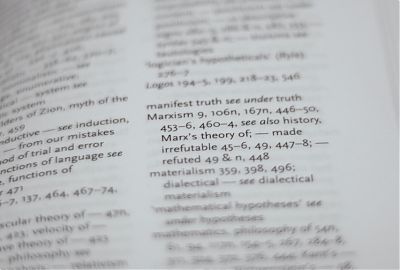Politics Philosophy · 2 November 2011 ·
Popper: Irrefutable Marxism has been refuted?

It’s been an in-joke amongst Popper’s critics like Paul Feyerabend and Imre Lakatos that in the subject index of Popper’s Open Society and it’s Enemies lists Marxism as “—irrefutable” and “—refuted” at the same time (Lakatos & Feyerabend, 2010).
But for Popper this is not so much of a problem—he distinguishes between different kinds of Marxism, the original one proposed by Marx and the numerous attempts by his followers to evade refutation. He argues that the original position has indeed made potentially falsifiable predictions about the course of history, and these predictions have been refuted. One example for a falsified prediction of Marx’s theory is the establishment of communism in a non-industrial country like Russia. According to Marx, communism would start in a developed country with a sufficiently large worker’s population, rather than a rural country, like Tsarist Russia. Furthermore, the socialist government was not able to establish a state of governance that would have fulfilled Marx’s criteria of Socialism, and did not lead to a transition to communism1, but eventually faltered. These observations lead to a reinterpretation of Marxist theory, that accounted for all possible interpretations: Whatever happened, it became impossible to say: “Marxism didn’t account for that”, for it was possible to explain everything in with Marxist terminology. Thus Popper writes:
The Marxist theory of history, in spite of the serious efforts of some of its founders and followers, ultimately adopted this soothsaying practice. In some of its earlier formulations (for example in Marx’s analysis of the character of the “coming social revolution”) their predictions were testable, and in fact falsified. Yet instead of accepting the refutations the followers of Marx re-interpreted both the theory and the evidence in order to make them agree. In this way they rescued the theory from refutation; but they did so at the price of adopting a device which made it irrefutable. They thus gave a “conventionalist twist” to the theory; and by this stratagem they destroyed its much advertised claim to scientific status.
It is important to note that for Popper wasn’t so much concerned about truth, but how we get there. In his view, we cannot prove anything. But we can use a method of conjecting a theory, and then attempt to refute it. If it withstands these tests, there is probably more truth in it than in a theory that doesn’t. Popper used this to address the problem of demarcation, i.e. distinguishing between science and non-science. A scientific theory is any kind of theory that makes such predictions and the riskier the predictions are, the better the theory is. A non-scientific theory however does not make any risky predictions, and it is not possible to falsify it. Put together, this also means that a falsified scientific theory is still scientific, even if we may want to reject it on a factual level. However, an unfalsifiable theory is not, even if it is supported by all the evidence, because we cannot test it. This does not mean that it is factually wrong (although we cannot make any statements about this, because it is unfalsifiable).
Newer editions of Conjectures seem to have addressed this pun, as the above picture from my 2002 edition shows: Marxism has been “—refuted” and is “—made irrefutable”. (emphasis added) I am not sure whether old editions don’t, quite possibly Lakatos and Feyerabend just brushed over this for the lolz.
However, there is a serious point to make: As Lakatos and Feyerabend argue2, one of the weaknesses of Popper’s critical rationalism is, historically there can be considerable disagreement as to what counts as a falsification, and what we are supposed to do when one of many predictions of a theory fail. Thus, as Lakatos and Feyerabend argue, almost every falsifiable theory will be falsified at one point, but we may not (yet) wish to discard it. In reply, Popper conceded that scientific theories consist of a core hypothesis and auxiliary hypotheses, and these auxiliary hypotheses might be falsified without forcing us to reject the core. Instead, we may save the core hypothesis by suggesting a new, ad-hoc hypothesis. This solution however dilutes Popper’s critical rationalism considerably, and makes the stringent boundaries quite fuzzy again.
References
Lakatos, Imre & Feyerabend, Paul, (2010) For and Against Method: Including Lakatos’s Lectures on Scientific Method and the Lakatos-Feyerabend Correspondence, Chicago University Press
Popper, Karl R. (2002) Conjectures and Refutations, Routledge: London
Popper, Karl R. (1963) Science as Falsification (published in the 1963 edition of Conjectures and Refutations.
Popper, Karl R. (2002) The Open Society and its Enemies [Volume 2], Routledge: London
1 One might object that the Bolshevik regime does not represent what Marx considered as Socialism, but this has two pitfalls: 1) Why was Marx not able to predict this part of the history? 2) Such an interpretation also makes the predictions irrefutable unless it clearly specifies when and under which circumstances the ‘real’ Socialist revolution occurs.
2 I quote Feyerabend and Lakatos as if they were generally in agreement, but this agreement was largely restricted to their criticism of Popper. Their own positions were largely diametrically in opposition to each other. Whilst for Lakatos, there was at least some sort of progress, this notion was alien to Feyerabend: For him science had the same status as folk beliefs and neither one or the other brought progress that was worthwhile. Rather, we should believe whatever we feel is best for us, and remain sceptical over all attempts to describe the truth.
Add a comment
Previous comments